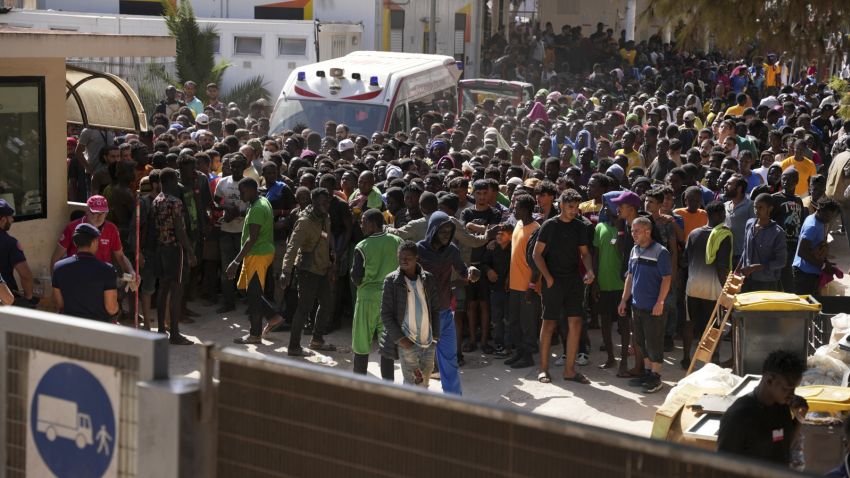The European Union’s plan to reform how it handles irregular migration passed a key hurdle on Wednesday, as the European Parliament voted through a package that will fundamentally change how the bloc tackles huge numbers of people, often seeking asylum while fleeing conflict in their own countries.
The wide-ranging reforms are designed to ease the burden on countries that have historically taken the most asylum-seekers among the EU’s 27 member states. Countries that are geographically closer to the EU’s southern borders, like Greece, Italy and Malta, have seen vast numbers of people coming from the Middle East and North Africa in the aftermath of the Arab Spring and Syrian civil war.
Roberta Metsola, President of the European Parliament, said: “We have delivered a robust legislative framework on how to deal with migration and asylum in the EU.
It has been more than ten years in the making. But we kept our word.”
Under a law known as the Dublin Regulation, member states were responsible for processing asylum-seekers who first arrived in the EU at their border, with little central help from Brussels or the other member states. That regulation will now be overhauled as part of these reforms. In theory, the EU will now spread the burden across the 27 member states, either through relocation of people to other member states or through financial and practical assistance in processing refugee claims.
Why is this happening now?
As is so often the case with EU reform, politics is the main driving factor. Migration is set to be a key issue in June’s European elections. As things stand, it is expected that anti-immigration politicians will perform well enough to have blocking power within the EU parliament.
“It was vital to get these reforms through before the elections, so the mainstream EU parties can say they are actively doing something about migration,” says Joelle Grogan, senior researcher at UK in a Changing Europe.
Beyond the European elections, the right is having something of a resurgence. In a number of EU countries – notably Italy, Hungary, Slovakia and Sweden – anti-immigrant Euroskeptic politicians are in power, either outright or through coalition. In other major countries, including France and Germany, they are significant opposition voices.
This trend, Grogan says, has led to the European political mainstream “accommodating these voices through policies on migration and national security in the hope of appealing to their voters.”
Will these reforms do the job?
The EU will rightly celebrate this victory after years of negotiation on one of the thorniest policy issues on the continent, but the reforms are not as wide ranging as some had hoped.
While the Dublin Regulation is being overhauled, the burden of processing migrants will still mostly fall on the countries where they land. There are factors, such as if they hold a diploma obtained in the past six years from another member state or have family elsewhere in the bloc, that will allow them to apply elsewhere. But as Alberto Neidhardt, senior analyst at the European Policy Centre, points out: “We can assume that this will affect only a small number of people. These are just cosmetic changes.”
The other key part of these reforms is something called the solidarity mechanism, which makes it mandatory for other member states to help those most affected by migration through taking people themselves (EU rules will set this as a minimum of 30,000 per member state per year); financial support (set at $600 million a year); or assistance with capacity – which could include lending personnel.
However, the EU says that member states will “have full discretion as to the type of solidarity they contribute” and that no EU country will be “obliged to carry out relocations,” though there will be exceptional circumstances.
This, Neidhardt says, is where the politics could get tricky once again.
“This will all take a couple of years to implement in the first place, so there will not be changes overnight,” he says.
“And it will ultimately be up to the member states themselves to decide how these new measures are practically managed. It’s not impossible that you will see horse trading over who is allowed to just give cash and who will be asked by their counterparts to take people.”
And it is also likely that this will get caught up with other EU issues. There are ample recent examples of member states digging their heels in on one issue – funding for Ukraine or Covid relief packages – in exchange for turning a blind eye to their breaking of EU rules.
The reforms contain lots of other controversial measures, including sending money outside the bloc to encourage other countries to stop migration into the EU and the possibility of offshoring processing. However, Brussels has yet to outline exactly how any of this will work and is expected to publish an implementation plan in the coming weeks.
What does it mean for migration?
Grogan says that more important than what these reforms actually achieve is “whether they give member states and their voters the perception that they are controlling migration better.”
The solidarity mechanism should also help build trust between the member states, which has historically been poor when it comes to migration. Neidhardt says that “a common set of rules, even if countries take different approaches, should in theory level the playing field a bit.”
The EU tends to operate more smoothly when member states are getting along and the politics is relatively stable. Few in Brussels will admit it, but that is a large part of what these reforms are about. And their relative success or failure will only play a small part in how united the EU will be in the coming years, as it still faces challenges on multiple fronts, from Ukraine to climate change and, arguably most importantly of all, who ends up in charge of their most important ally, the United States, at the start of next year.



